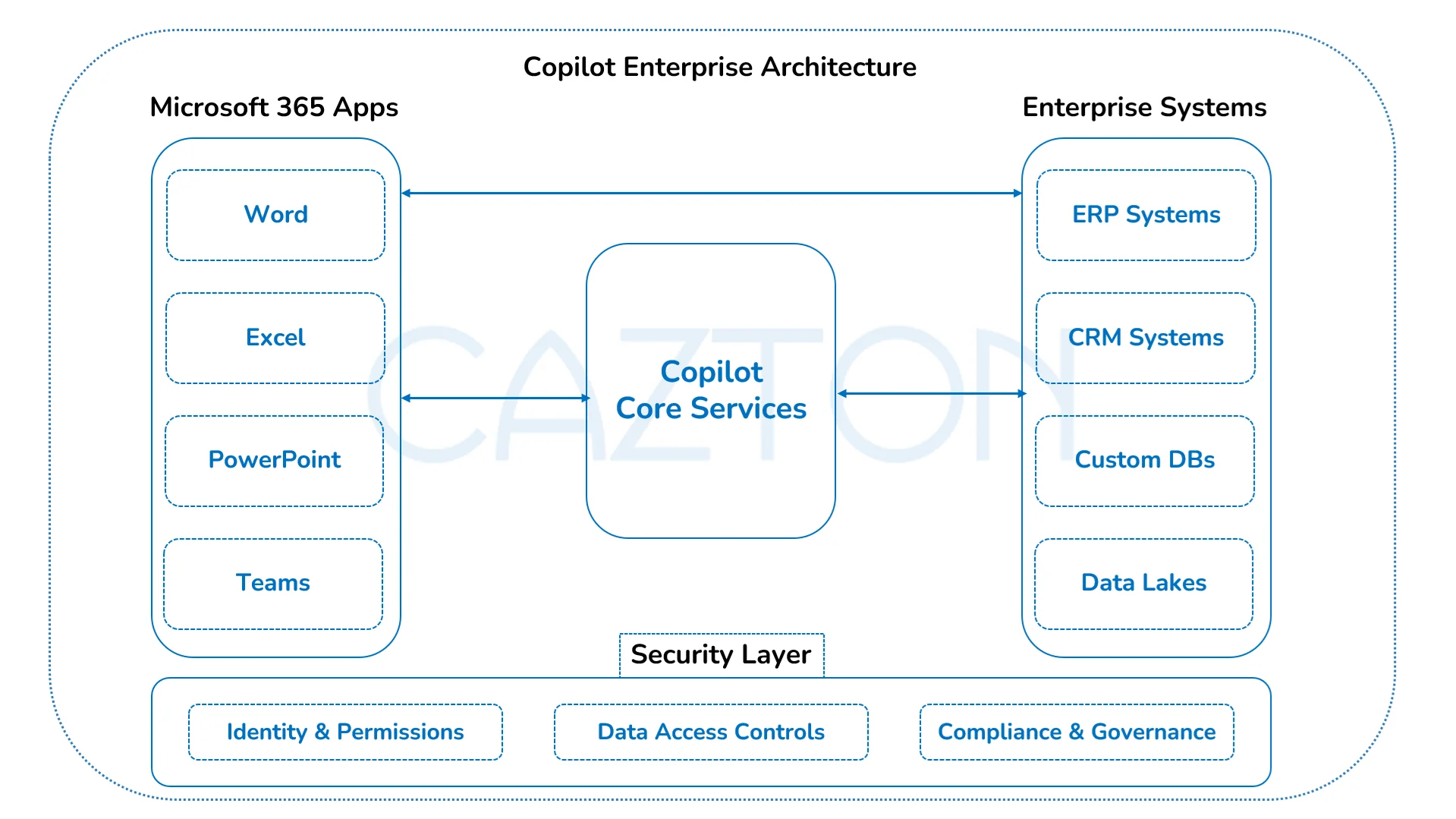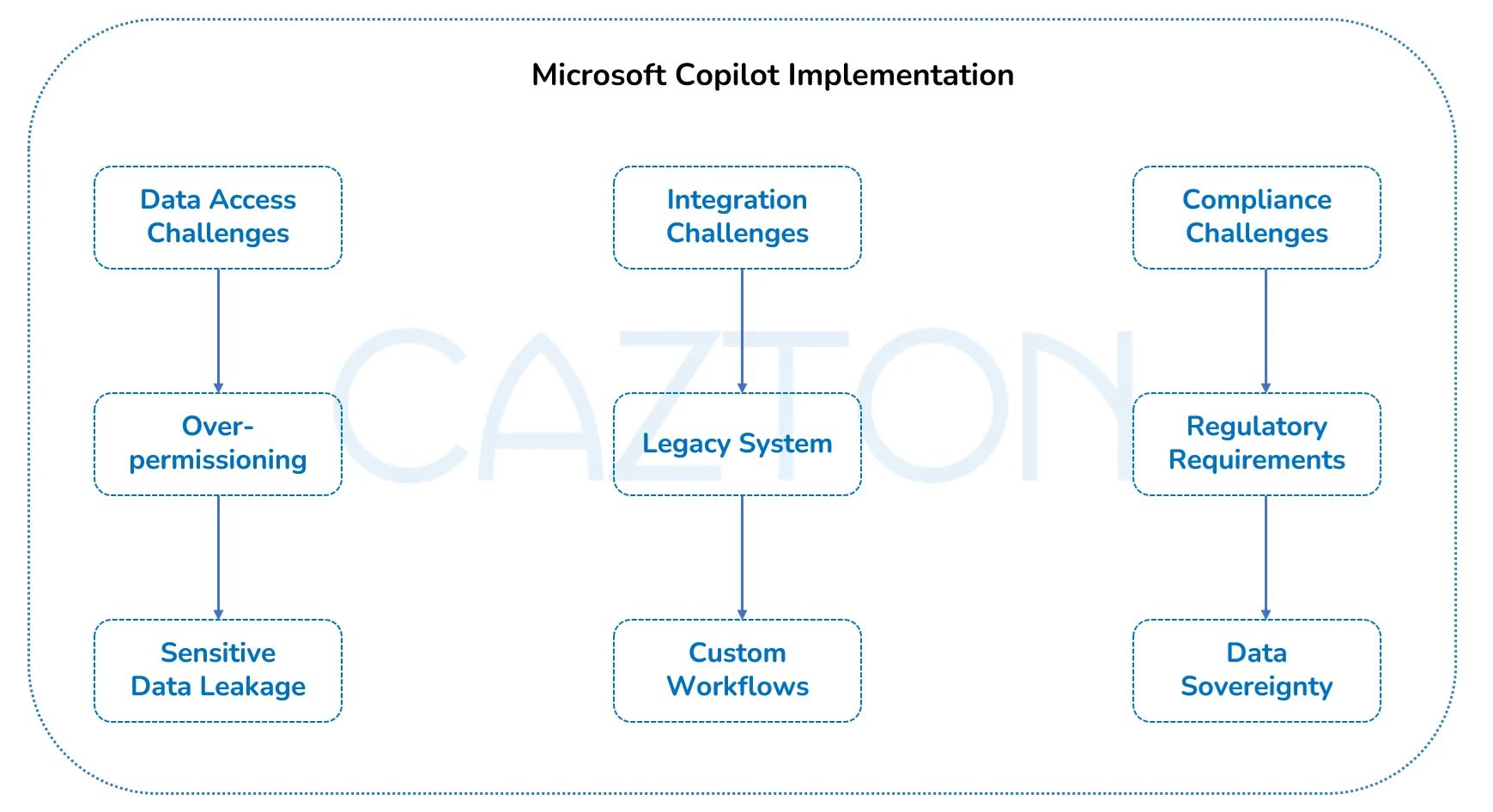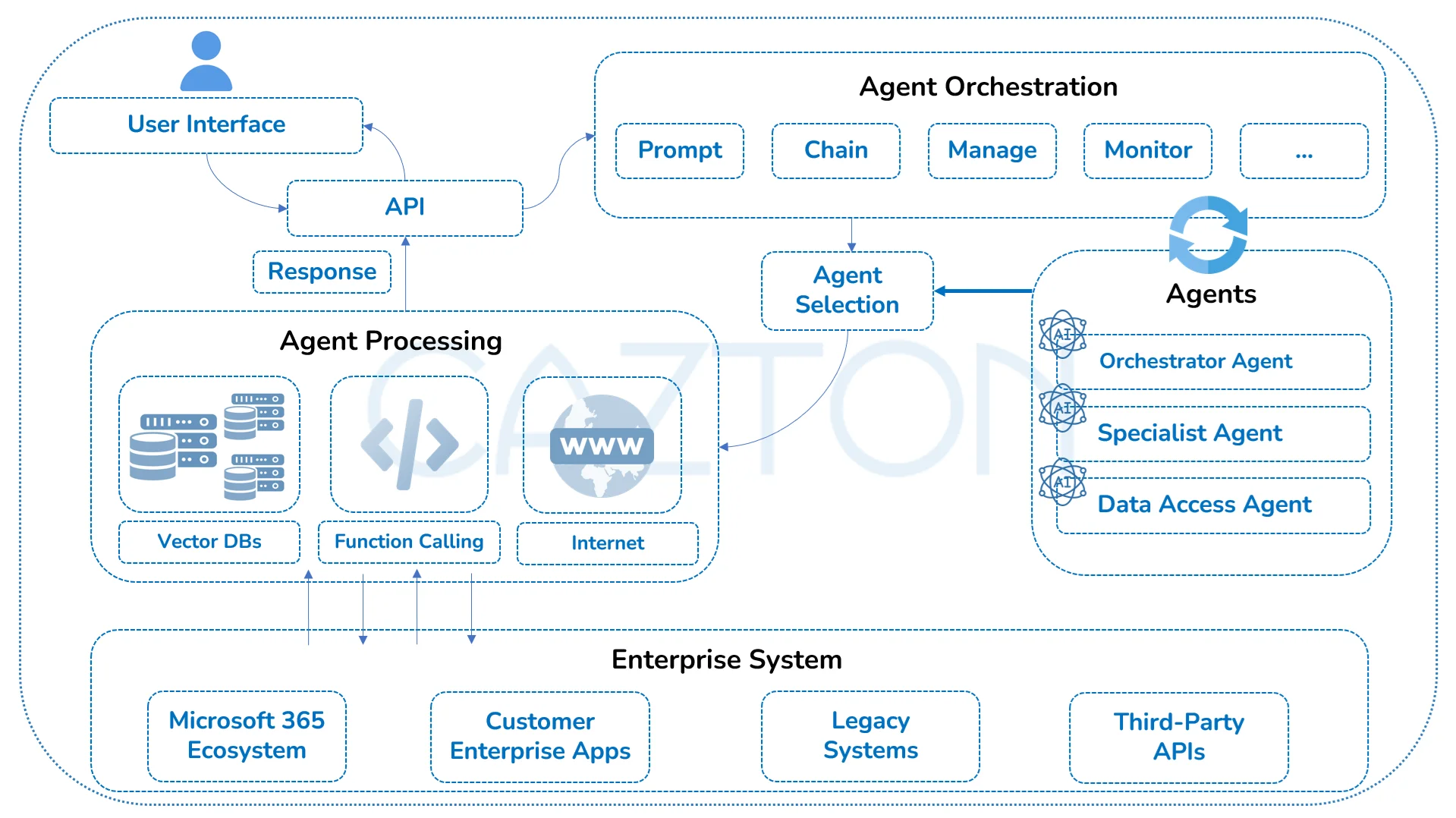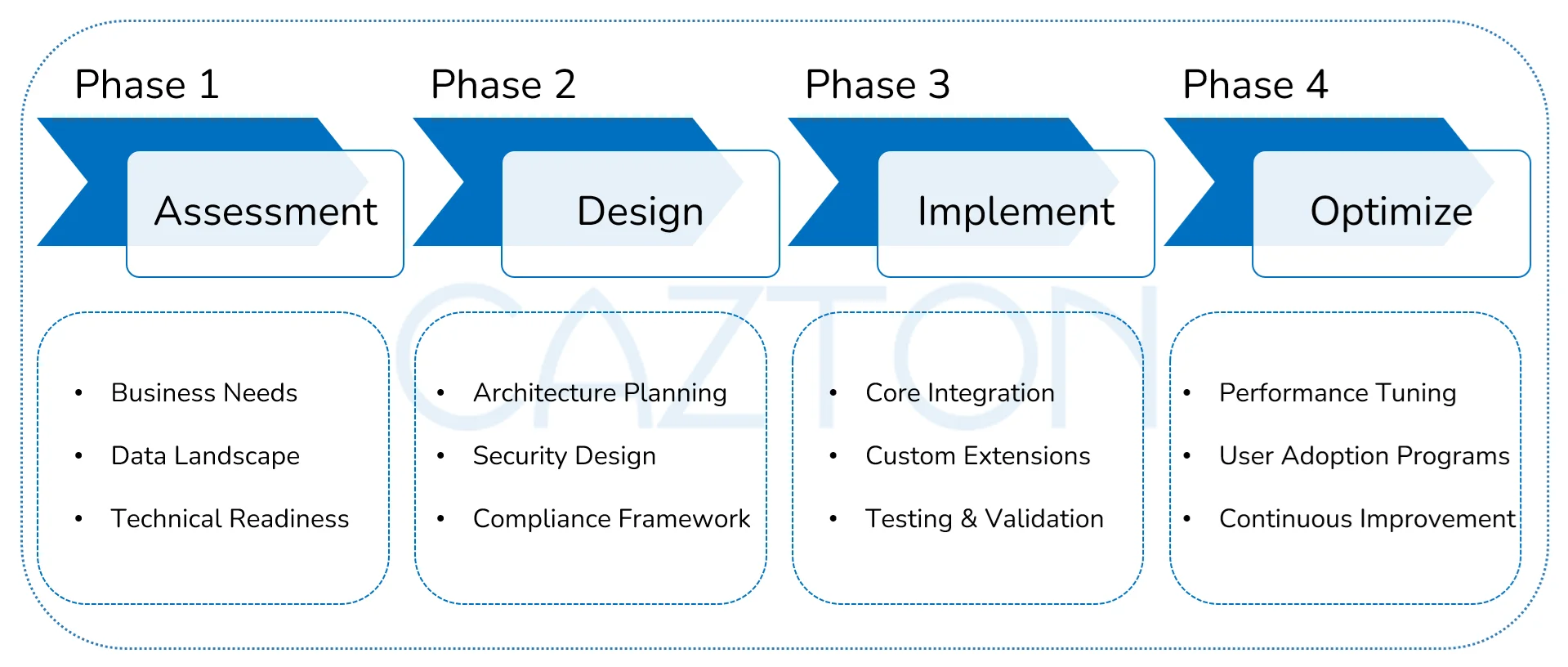Copilot Consulting
- Beyond basic AI - The Copilot revolution: Microsoft Copilot is not just a tool - it's an entire AI ecosystem that transforms how businesses operate, but only when implemented strategically.
- Multi-agent systems that work together: While competitors use single AI assistants, we orchestrate sophisticated multi-agent systems that work together to solve your most complex business challenges.
- AI across every format: We help you implement voice, text, image, and video AI across workflows - from audio-driven support to image-based diagnostics and video summarization.
- Why most Copilot implementations fail: Out-of-the-box Copilot lays the foundation, but our custom integrations and governance frameworks elevate ROI and drive measurable business outcomes.
- From license to competitive advantage: Purchasing Copilot is just the first step - our strategic implementation approach transforms technology investment into sustainable competitive advantage.
- Proven partnership with Microsoft: We work closely with OpenAI, Azure OpenAI and many other Microsoft teams. Thanks to Microsoft for providing us with very early access to critical technologies. We are fortunate to have been working on GPT-3 since 2020, a couple years before ChatGPT was launched.
- Trusted by industry leaders: We help Fortune 500, large, mid-size and startup companies with Big Data and AI development, deployment (MLOps), consulting, recruiting services and hands-on training services. Our clients include Microsoft, Google, Broadcom, Thomson Reuters, Bank of America, Macquarie, Dell and more.
Microsoft Copilot is more than just a tool - it’s a bold vision for how AI can transform the way enterprises operate, develop, and innovate. From document creation to coding assistance to business analytics, its promise is transformative. Yet for many organizations, the journey from vision to value is anything but straightforward. In real-world deployments, companies are grappling with unexpected data exposure risks, inconsistent AI outputs, significant costs per user, and complex integration requirements that slow adoption. Without a strategic framework, these challenges can erode trust, dilute ROI, and stall momentum. That's where expert guidance makes the difference - helping enterprises move beyond experimentation toward tangible, repeatable business outcomes.
At Cazton, we've helped many enterprise clients bridge this gap through deep expertise gained from years of pioneering AI work. We were the first company in the world to implement evals on GPT-4 even before OpenAI, and we've continued to stay ahead by combining deep technical breadth with practical enterprise experience. We've seen firsthand how the right strategic approach to Copilot implementation can deliver 3x productivity gains, reduce operational costs by 40%, and accelerate time-to-market for new products. More importantly, we've learned why some implementations succeed while others fail to deliver meaningful ROI.
This isn't about technology for technology's sake. It's about positioning your organization to compete and win in an AI-driven future.
Microsoft Copilot: Your Unified AI Ecosystem
Let's cut through the marketing noise and explain what Microsoft Copilot is - and more importantly, what it means for your business.

Microsoft Copilot isn't a single product; it's a family of AI-powered tools designed to work together across your entire technology stack. Think of it as an intelligent layer that sits on top of your existing Microsoft investments, making every application smarter and every process more efficient.
- Microsoft 365 Copilot transforms how your teams work with everyday applications like Word, Excel, PowerPoint, and Outlook. Instead of spending hours creating presentations or analyzing spreadsheets, your employees can focus on strategy and decision-making while Copilot handles the routine work. Many organizations are already seeing significant reductions in time spent on repetitive tasks, freeing up their teams to focus on higher-value work like insights, planning, and innovation.
- GitHub Copilot revolutionizes software development by providing intelligent code suggestions and automation. Your development teams can write better code faster, with fewer bugs and security vulnerabilities. Teams adopting Copilot often report noticeable improvements in productivity, enabling them to accelerate development cycles and deliver features more efficiently - without the immediate need to scale headcount.
- Azure Copilot simplifies cloud infrastructure management and optimization. Instead of requiring specialized expertise to manage complex cloud environments, your IT teams can leverage AI-powered recommendations for cost optimization, security improvements, and performance tuning. This is particularly valuable for organizations looking to maximize their cloud investments while minimizing operational overhead.
- Copilot Studio enables you to build custom AI assistants tailored to your specific business processes and industry requirements. This is where the real transformation happens - when you move beyond generic AI tools to create intelligent systems that understand your business context, your data, and your unique challenges.
These tools work together to create a comprehensive AI ecosystem that spans productivity, development, infrastructure, and custom applications. The key is understanding how to orchestrate them strategically to achieve your specific business objectives.
Why Your Copilot Implementation Needs a Co-Pilot
Here's an uncomfortable truth: most out-of-the-box Copilot implementations deliver disappointing results.
The technology is good, but technology alone doesn't solve business problems. Every organization has unique data structures, specific compliance requirements, existing integrations, and particular workflows that must be considered for successful AI adoption.

- Security and compliance represent the first major hurdle. Enterprise AI implementations must address data governance, privacy regulations, and security protocols that don’t exist in consumer AI applications. Your Copilot deployment must ensure that sensitive information remains protected while enabling AI capabilities across your organization. This requires careful configuration of data access permissions, implementation of audit trails, and establishment of governance frameworks - all areas where we bring proven expertise to help enterprises scale securely and responsibly.
- Data integration challenges often determine the success or failure of AI initiatives. Copilot’s effectiveness depends on the quality and accessibility of your organizational data. Most enterprises have data scattered across multiple systems, in various formats, with inconsistent quality standards. We’ve helped global organizations unify, clean, and connect their data ecosystems because creating AI systems that can access, understand, and act on your data requires far more than just turning Copilot on.
- Change management is another critical factor. Many Copilot rollouts underdeliver not because the tech isn’t capable, but because users aren’t properly onboarded. Without clear guidance, training, and communication, adoption suffers. We design strategies that align Copilot with real user behavior, helping your teams embrace AI instead of resisting it.
- Expectation gaps also derail success. Executives often expect immediate productivity gains, but without aligning Copilot’s capabilities with specific business use cases, value remains vague. We help define those high-impact use cases from the outset, ensuring every interaction with Copilot supports a tangible business objective.
- Technical expertise matters because AI implementation involves complex decisions about architecture, integration patterns, performance optimization, and scalability planning. The difference between a successful Copilot deployment and a failed one often comes down to these technical details that aren't visible to end users but are critical for long-term success.
We don't believe in one-size-fits-all rollouts. Our approach is different. We start with your strategic objectives, map them to specific AI capabilities, and then design implementations that deliver measurable results. We've done this work for companies in healthcare, manufacturing, finance, real estate, construction, and government just to name a few. We understand the technical challenges, the compliance needs, and the political realities that shape enterprise AI adoption.
Your Copilot investment doesn't have to be a regret. With the right implementation, it becomes the productivity multiplier you thought you were buying. We’ve seen employees go from frustration to advocacy - where they stop complaining about the AI assistant and start asking for more features. That’s when you know it’s working. That’s the outcome we deliver.
Why Most Copilot Implementations Stall
When Copilot Becomes a Cost Center
You invested six figures into Microsoft Copilot. Your team was excited. Expectations were high. But now? Reality has set in.
Employees rarely use it - and when they do, the responses are generic and unhelpful. IT is buried in support tickets. Your “AI transformation” is starting to feel like an expensive mistake.
We’ve seen this story unfold across industries. The good news? It’s not a failure - it’s a signal. A signal that success with Copilot (and AI more broadly) requires more than just turning it on.
Every Copilot implementation encounters predictable hurdles. Recognizing these early - and planning around them - is the key to unlocking real value. These are the most common roadblocks we help organizations overcome:
- Common implementation roadblocks include data quality issues, integration complexity, user adoption resistance, and performance optimization requirements. The organizations that succeed are those that anticipate these challenges and plan accordingly.
- Data privacy and security solutions require comprehensive approaches that address not just technical controls but also governance processes and compliance frameworks. This includes implementing data classification systems, access controls, audit mechanisms, and privacy protection protocols that meet regulatory requirements while enabling AI capabilities.
- Performance optimization strategies become critical as AI usage scales across your organization. This includes infrastructure planning, caching strategies, load balancing, and monitoring systems that ensure consistent performance even as demand grows.
- Change management and user adoption often determine the ultimate success of AI implementations. The most sophisticated AI systems fail if users don't adopt them or use them effectively. This requires training programs, support systems, and incentive structures that encourage AI adoption while addressing user concerns.
We've learned that successful Copilot and custom AI implementations require as much attention to organizational change as technical implementation. This includes executive sponsorship, champion networks, training programs, and feedback mechanisms that ensure AI tools deliver value to end users.
Tailoring Copilot to Your Business
One Size Doesn't Fit All
The most successful Copilot implementations are those that recognize each component of the ecosystem serves different business functions and requires different implementation strategies.
Microsoft 365 Copilot: Transforming Everyday Productivity
Knowledge workers spend up to 60% of their time on repetitive tasks. Microsoft 365 Copilot can reclaim that time - if implemented thoughtfully. The key lies in identifying which improvements will drive the greatest impact, such as AI-generated briefing docs for executives, smart proposal tools for sales, or intelligent reporting for finance.
We go beyond licensing by conducting workflow analysis, designing reusable templates, and creating training and governance frameworks. This ensures consistent, high-quality outputs that scale with your teams and deliver ROI from day one.
GitHub Copilot: Accelerating Development Without Sacrificing Quality
GitHub Copilot can speed up software development, reduce bugs, and enable junior developers to contribute faster but only when deployed with the right engineering practices. Business value extends far beyond typing speed; it impacts time-to-market, product quality, and team collaboration.
We help organizations implement Copilot with enterprise-grade safeguards - integrating code review policies, secure development pipelines, and performance benchmarks to maximize gains without compromising code integrity.
Azure Copilot: Simplifying Cloud Operations
Managing cloud infrastructure is becoming increasingly complex, especially in hybrid or multi-cloud environments. Azure Copilot reduces this burden with AI-driven insights that optimize performance, flag cost inefficiencies, and automate routine operations.
We work with clients to integrate Azure Copilot into broader cloud strategies, creating optimization frameworks and governance policies that align cloud operations with business goals - reducing overhead while increasing reliability.
Copilot Studio: Building Custom AI Assistants
Copilot Studio enables businesses to go beyond productivity and build AI agents tailored to their exact needs - whether it's a customer support assistant that pulls real-time data, or an operational tool that handles supply chain analytics.
We focus on building scalable, maintainable AI assistants that evolve with your business. Our approach includes architecture design, continuous improvement workflows, and integration with proprietary systems to drive real, lasting transformation.
Extending Copilot for Enterprise
The difference between consumer AI and enterprise AI isn't just about scale - it's about sophistication and integration.
Most organizations start with basic Copilot interactions: simple queries, document generation, and code suggestions. While these provide immediate value, the real transformation happens when you extend Copilot capabilities to integrate with your business systems and processes.
- Custom connectors and API integrations enable Copilot to access your proprietary data sources, from CRM systems to manufacturing databases. This means your AI assistants can provide insights based on real-time business data, not just generic information. For example, a sales assistant that can access current inventory levels, pricing matrices, and customer purchase histories can provide much more valuable recommendations than one limited to general sales advice.
- Enhancing Copilot with proprietary data requires careful attention to data quality, security, and governance. Your AI systems are only as good as the data they can access, which means implementing data pipelines, quality controls, and access management systems that ensure AI applications have reliable, secure access to the information they need.
- Creating domain-specific knowledge bases allows you to train AI systems on your industry expertise, internal processes, and organizational knowledge. This is particularly valuable for complex industries with specialized terminology, regulatory requirements, or unique operational processes.
- UI/UX considerations for AI-enhanced applications go beyond traditional software design principles. AI interfaces must help users understand system capabilities, provide transparent decision-making processes, and gracefully handle situations where AI systems encounter limitations or errors.
- Technology stack compatibility and optimization considerations include infrastructure requirements, integration patterns, performance characteristics, and scalability planning. These technical decisions have long-term implications for your AI strategy and must be made with careful attention to business objectives and constraints.
We've helped clients across a wide range of industries create custom Copilot extensions customized to their unique business needs. In regulated sectors, we have built AI assistants that navigate compliance requirements with ease. In operationally complex environments, we have developed systems that optimize workflows based on real-time data, forecasts, and constraints.
The Rise of AI Agents
The next evolution in enterprise AI moves beyond reactive tools to proactive intelligent AI agents that can take actions on behalf of users.
Traditional AI tools respond to queries and provide information. Intelligent agents can monitor business conditions, identify opportunities or problems, and take appropriate actions automatically. This represents a fundamental shift from AI as a productivity tool to AI as a business process participant.
- Agents differ from basic AI tools in their ability to maintain context over time, learn from interactions, and integrate with multiple systems to accomplish complex tasks. For example, a customer service agent might monitor support tickets, identify patterns that suggest system issues, automatically escalate critical problems, and proactively communicate with affected customers.
- Implementation considerations for enterprise environments include security frameworks, audit capabilities, exception handling, and human oversight mechanisms. Agents that can take action require more sophisticated governance than tools that only provide information.
We've developed enterprise-grade AI agent solutions for clients across industries.
- A logistics client implemented agents that monitor supply chain disruptions and automatically adjust delivery schedules.
- A financial services client created agents that monitor market conditions and execute trading strategies within predefined parameters.
- A trading client uses our agents to thwart cybercriminals. In healthcare, our multi-agent systems analyze patient data across disparate EHR systems to identify high-risk cases missed by traditional screening protocols.
- Manufacturing clients use our orchestrated agents to coordinate production planning and predictive maintenance, reducing downtime.
- Retail organizations deploy our conversational agents that maintain context across multiple customer touchpoints to deliver hyper-personalized recommendations.
- Energy sector clients leverage our monitoring agents to optimize grid performance and prevent costly outages.
- Insurance companies utilize our claims processing agents to detect fraud patterns invisible to human adjusters.
- Telecommunications providers implement our network optimization agents to dynamically allocate bandwidth during usage spikes. Agencies employ our document processing agents to extract critical information from millions of unstructured records.
- Healthcare companies use our custom research agents to identify promising compounds by analyzing patterns across a wide range of studies.
The key to successful agent implementation is starting with well-defined use cases where the business rules are clear and the potential impact is significant. This allows you to build confidence in agent capabilities while establishing governance frameworks that can scale to more complex applications.
Orchestrating Multi-Agent Systems
The most sophisticated AI implementations involve multiple specialized agents working together to solve complex business problems.

Multi-agent architecture for Enterprise Solutions
Multi-agent systems enable you to create AI ecosystems where different agents handle different aspects of business processes. For example, a comprehensive customer service system might include agents specialized in technical support, billing inquiries, product recommendations, and escalation management, all working together to provide seamless customer experiences.
- Benefits of specialized agents working together include improved accuracy, as each agent focuses on its area of expertise; better scalability, since new functions can be added without rebuilding existing systems; and increased reliability, because if one agent encounters problems, others can continue operating.
- Implementation challenges include coordination protocols, data sharing mechanisms, and conflict resolution procedures. When multiple agents are making decisions and acting, you need robust systems to ensure they work harmoniously rather than against each other.
We have developed frameworks for designing and deploying multi-agent systems that address these challenges. Our approach includes agent communication protocols, shared data models, and orchestration engines that coordinate complex workflows across multiple AI systems.
We recently implemented a multi-agent system for a manufacturing client that coordinates production planning, supply chain management, quality control, and maintenance scheduling. The result was a significant reduction in operational costs along with noticeable improvements in on-time delivery and overall process efficiency - driven by intelligent coordination across key business functions.
Your Copilot Journey: From Strategy to Implementation
Successful Copilot adoption requires a strategic approach that aligns AI capabilities with business objectives while building organizational capabilities for long-term success.

- Creating your Copilot roadmap starts with understanding your current state, defining your desired outcomes, and identifying the most valuable use cases for AI implementation. This includes conducting capability assessments, stakeholder interviews, and pilot project planning that establishes a foundation for scaled AI adoption.
- Building internal capabilities and governance ensures that your organization can effectively manage and optimize AI systems over time. This includes establishing AI governance committees, developing policies and procedures, and building internal expertise that reduces dependence on external support.
- Measuring success and ROI requires establishing metrics that capture both quantitative benefits such as productivity improvements, cost reductions, and revenue increases, as well as qualitative outcomes like improved employee satisfaction, better customer experiences, and stronger decision-making capabilities.
- Long-term AI strategy considerations include staying current with AI technology evolution, planning for integration with emerging technologies, and building organizational capabilities that enable continuous innovation and improvement.
We partner with clients throughout their Copilot journey, from initial strategy development through full-scale implementation and ongoing optimization. Our approach ensures that your AI investments deliver immediate value while building capabilities for long-term competitive advantage.
How Cazton Can Help You With Copilot
Maximizing Your Copilot Investment
Microsoft Copilot represents one of the most significant opportunities for enterprise transformation in decades. The technology is mature, the business case is proven, and the competitive advantages are substantial. But success requires more than technology - it requires strategic thinking, careful implementation, and ongoing optimization.
The organizations that will lead their industries in the next decade are those that move beyond basic AI adoption to create sophisticated, integrated AI ecosystems that transform how they operate, compete, and grow.
At Cazton, we've helped many enterprise clients navigate this transformation successfully. We understand the technical complexities, the organizational challenges, and the strategic decisions that determine success or failure. More importantly, we've developed methodologies and frameworks that ensure your Copilot investment delivers measurable business results from day one.
Most teams know how to call a language model API - but building reliable, production-ready AI systems takes more than that. We help you build production-ready systems that go beyond basic usage. Success with AI requires a broad, deep toolkit: prompting techniques that maximizes precision, agentic frameworks to manage workflows, evals to measure performance, guardrails to ensure safety, and RAG architectures to ground responses in verified data.
From implementing full voice stacks and asynchronous pipelines to managing data extraction, embeddings, and vector databases, we specialize in solutions that work across modalities and systems. Our experience includes GraphDB usage with LLMs, intelligent browser or computer agents, model-context protocol (MCP), and reasoning models that support complex logic. Whether you’re looking to build intelligent agents, automate workflows, or launch multimodal AI applications, we give you not just the tools - but the blueprint and expertise - to make it all work.
Here are our offerings:
- Strategic consulting:
- Copilot road mapping: Align Copilot features with your business goals and design a phased implementation plan.
- AI architecture design: Define scalable AI workflows using Copilot, AI agents, and Microsoft’s data platforms.
- Governance strategy: Implement policies for data access, security, and responsible AI use across departments.
- Custom Copilot development:
- Domain-specific Copilots: Build tailored Copilot experiences for legal, finance, healthcare, and more.
- AI agent orchestration: Develop and deploy task-specific agents that enhance Copilot’s capabilities.
- Copilot Studio extensions: Develop advanced plugins, prompt chains, and workflow integrations.
- Enterprise integration services:
- Data & system integration: Connect Copilot with SharePoint, Teams, Dynamics 365, Salesforce, SQL Server, and legacy systems.
- RAG and embeddings: Implement retrieval-augmented generation pipelines with secure, role-based access to internal data.
- Custom APIs: Build secure APIs to expose enterprise data and trigger business logic through Copilot.
- Performance optimization:
- Prompt engineering: Improve Copilot output with role-specific prompts and layered context.
- Scalability planning: Architect for high-volume Copilot usage across thousands of users.
- Latency reduction: Streamline integrations for fast, reliable AI interactions at scale.
- Security & compliance:
- Enterprise security design: Implement Copilot securely within GCC High, multi-tenant, or hybrid environments.
- Compliance support: Align with HIPAA, GDPR, FedRAMP, and internal risk policies.
- Audit and monitoring: Set up logging, auditing, and access control frameworks.
- Infrastructure & DevOps:
- Deployment support: Launch Copilot in Azure, hybrid, or on-premises environments with confidence.
- Monitoring & feedback loops: Track Copilot usage, identify gaps, and iterate with real-time analytics.
- Support for .NET Aspire & modern frameworks: Integrate Copilot with containerized, scalable microservices.
- Training & enablement:
- Copilot training workshops: Equip your teams with knowledge to use, extend, and manage Copilot effectively.
- Copilot Studio bootcamps: Hands-on guidance for business and technical teams building custom copilots.
- Governance & handoff: Empower internal teams with playbooks, roles, and best practices.
- Innovation & proof of concepts:
- Accelerator programs: Rapid prototyping of Copilot use-cases to validate value early.
- Innovation labs: Collaborate with your teams on next-gen AI experiences across departments.
The question isn't whether AI will transform your industry - it's whether you'll lead that transformation or respond to competitors who moved first.
Ready to maximize your Copilot investment? Contact us today to discuss how we can help you design and implement an AI strategy that delivers sustainable competitive advantage. Your future success depends on the decisions you make today about AI adoption and implementation.
Reach out to our AI strategy team to schedule your complimentary Copilot assessment and implementation roadmap session.
Cazton is composed of technical professionals with expertise gained all over the world and in all fields of the tech industry and we put this expertise to work for you. We serve all industries, including banking, finance, legal services, life sciences & healthcare, technology, media, and the public sector. Check out some of our services:
- Artificial Intelligence
- Big Data
- Web Development
- Mobile Development
- Desktop Development
- API Development
- Database Development
- Cloud
- DevOps
- Enterprise Search
- Blockchain
- Enterprise Architecture
Cazton has expanded into a global company, servicing clients not only across the United States, but in Oslo, Norway; Stockholm, Sweden; London, England; Berlin, Germany; Frankfurt, Germany; Paris, France; Amsterdam, Netherlands; Brussels, Belgium; Rome, Italy; Sydney, Melbourne, Australia; Quebec City, Toronto Vancouver, Montreal, Ottawa, Calgary, Edmonton, Victoria, and Winnipeg as well. In the United States, we provide our consulting and training services across various cities like Austin, Dallas, Houston, New York, New Jersey, Irvine, Los Angeles, Denver, Boulder, Charlotte, Atlanta, Orlando, Miami, San Antonio, San Diego, San Francisco, San Jose, Stamford and others. Contact us today to learn more about what our experts can do for you.


